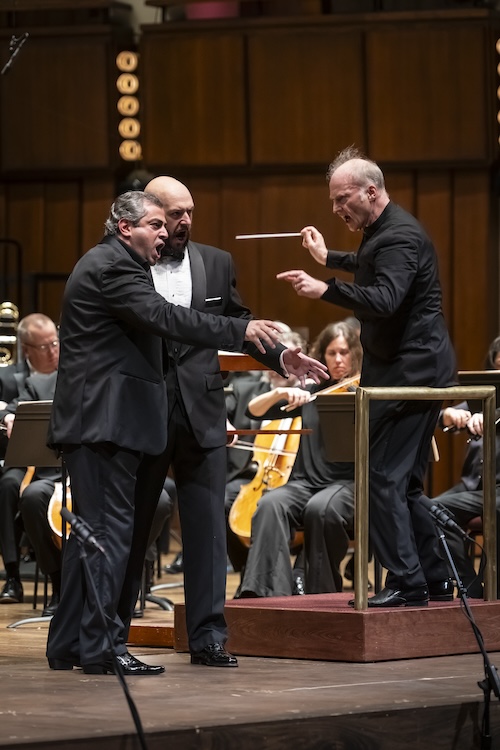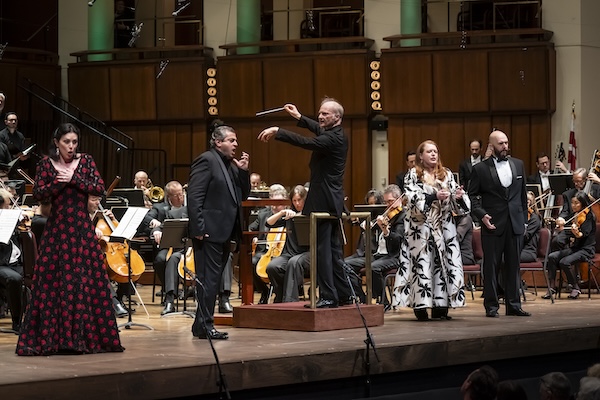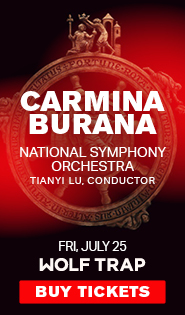Noseda, NSO and strong cast deliver the grandeur and intimate drama of “Otello”

Erika Grimaldi as Desdemona and Arsen Soghomonyan in the title role of Verdi’s Otello, in a concert performance by the National Symphony Orchestra Friday night at the Kennedy Center. Photo: Scott Suchman
When an orchestra does an opera in concert, it’s a celebration: a big event that feels special, festive and a little out of the ordinary, as if the hosts were putting on a costume party and slipping into a new role for the occasion.
This was certainly the case on Friday night, when the National Symphony Orchestra — which has a history of strong outings in the concert-opera genre — and its music director, Gianandrea Noseda, ended their season with the first of two much-anticipated performances of Giuseppe Verdi’s Otello — and gave us a truly special night.
Verdi had a knack for writing grand operas that are also intimate: think of Aida, which is a byword for bombast (the elephants!) yet concludes with two acts of psychological drama that feel like chamber opera. Otello is another case in point: a quick-moving, gut-wrenching evening that grabs you up in the midst of a storm at sea and carries you through increasingly intimate exchanges until it ends in the marital bedroom with the protagonist’s last sobbing breath over the body of his wife.
Yet Noseda and his forces also put the grandeur front and center. Sitting in the Kennedy Center concert hall and seeing the wall of bodies on stage, the large orchestra below and the blended forces of the Choral Arts Society and the University of Maryland Concert Choir arrayed in the chorus seats above them, communicated a palpable sense of power and spectacle even before the first notes resounded through the hall.
Noseda’s NSO is playing better than any other incarnation experienced of that orchestra. In the early bars, its self-awareness gave the music a sense of polish that, combined with the chorus’s glass-clear diction, made one initially think the evening might offer Verdi at an aestheticized remove. But Noseda is too much an opera guy, and particularly an Italian opera guy, to let that happen. He likes grace, but he also gets drama. The result was scintillating, edge-of-the-seat Verdi, played throughout with an extra awareness of just how beautiful this score really is.
But what you really need to get memorable Verdi are memorable singers; and here, too, the NSO came through — likely boosted by Noseda’s relationships with the singers he’s worked with at his previous post at the Turin opera and his current one as the musical head of the opera house in Zurich.
For most people in attendance, the news of the evening was the tenor Arsen Soghomonyan. Otello’s entrance is one of the toughest and most thrilling in opera: he strides on stage in the aftermath of the storm and sings, at the top of his lungs over full orchestra, a whopping thirty seconds or so of music that establishes him as heroic and magnificent — or, as is all too often the case, lets people know they’ll be in for a long evening. Soghomonyan made it sound easy. He has a large, dark voice that sounds even through most of his registers and doesn’t have strain on top; combine that with committed acting and it’s more than you get for most Otellos.
Soghomonyan began his career as a baritone, only switching to tenor in 2017; he still sounds like a baritone, albeit one whose voice travels higher up the staff than the norm. He doesn’t have the tenorial “ping,” the bright edge of the voice that helps it cut through the tremendous orchestra, and his timbre is still so baritonal that when he and Roman Burdenko, the Iago, sang their “Si pel ciel” duet that ends Act II, their voices blended, rather than contrasting.
His high notes, while they sounded secure, were not quite of a piece with the rest of the voice, and he sometimes tried to make them sound more tenor-like by introducing a slightly nasal quality. As the evening continued, some of them verged more on shouting than singing; that could be explained as an exigency of the drama, but by the end of the night there was some audible fatigue in his sound, and his lower register was briefly out of gas. Even these nitpicks, are unlikely to cast much of a shadow on this singer’s star-is-born momentum.

Arsen Soghomonyan as Otello, Roman Burdenko as Iago and Gianandera Noseda conducting the NSO in Verdi’s Otello. Photo: Scott Suchman
Burdenko, too, had a Moment, playing a cold archvillain with a solid voice and clear diction that brought across all of his scheming (naturally aided by supertitles over the stage). Dramatically, he was a bit two-dimensional, although that’s a hard charge to bring against singers in a concert opera, who are bringing the whole thing to life without the benefit of sets, props, or direction. The cartoon-villain laugh at the end of his nihilistic “Credo” distracted when the real focus should be on his fine singing.
And the cast was strong across the board. Francesco Marsiglia had all the tenor ping and brightness you could ask for as Cassio, and the gifted Aaron Crouch made what he could of his few lines as the callow Rodrigo. Christian Simmons was a warm Lodovico, and Jennifer Johnson Cano was a forceful Emilia, singing with power as she broke into Desdemona’s bedroom and finally stood up to her husband Iago’s manipulations.
Noseda led everything with fluidity and utter commitment, reminding everyone, after his recent “Ring” cycles in Zurich, that this is his home turf; almost doing the limbo backward over the rail of his podium at times in his effort to include the vocal soloists in the wingspan of his conducting arms. And the orchestra kept on shimmering. The trumpets announcing the arrival of emissaries from Venice, stationed in the balcony above the chorus, were preternaturally gorgeous, like a Last Judgment heralded by angels who have only good news to bring. Act IV opened with such ravishing beauty, lingering on the English horn solo (kudos to Kathryn Meany Wilson), that it was as if their promise had already been fulfilled.
The start of Act IV is all Desdemona’s: a long tragic aria followed by a simple prayer. It’s a hard thing for a soprano to pull off: the action comes to a screeching halt while you sing delicately and quietly, and it’s easy for the scene to become static. More power, then, to Erika Grimaldi, an Italian soprano who has come to the NSO with Noseda before. In the Act I love duet, her timbre was reminiscent of the steeliness of that earlier outing — over-bright, hard-edged, and slightly brittle, both vocally and in her acting.
Yet in Act IV, after the gorgeous instrumental introduction, she met the orchestra where it was, at the same level of melting, heart-wrenching beauty, flowing from full-voiced anguish to a sustained, perfect thread of supported sound, at the cusp of audibility, and feeling every word. It was as fine a piece of singing as I’ve ever heard, and gave an evening that had already been wonderful the crowning touch that it deserved, the audience bound together in reverent silence.
One main beef with the NSO over the years has been that they too often played like people who are doing a job. On Friday, they played like people who were telling a story: and if it seemed like a role at a costume party, it was one that fit them very nicely, and left everyone wanting more.
The NSO is indeed offering another opera next year, but Noseda’s tastes are too catholic for him to take the obvious step of repeating Verdi: instead, he and the orchestra will offer Samuel Barber’s Vanessa, and the season will conclude with Beethoven’s Missa Solemnis. Whatever they offer, one can only wish that they will continue to bring as much reason to celebrate as they did with this profound and delightful evening.
Verdi’s Otello will be repeated 3 p.m. Sunday at the Kennedy Center. kennedy-center.org
Anne Midgette was for 12 years the classical music critic of the Washington Post; before that, she was a regular reviewer for the New York Times. She has also written for The Wall Street Journal. the Los Angeles Times, the late lamented Opera News, and many other publications. She is co-author of the memoirs “The King and I” (about Luciano Pavarotti and his manager) and “My Nine Lives” (about Leon Fleisher) and is currently working on a historical novel about the woman who built pianos for Beethoven.

Photo: Scott Suchman



Posted Jun 08, 2024 at 4:20 pm by Alan Karnovitz
You have inspired us to purchase tickets for the Sunday concert. Excellent review.
I totally agree on the evolution of the NSO. The orchestra now plays with so much more commitment and enthusiasm than just a few years ago. Yes there were many fine concerts, but complacency too often characterized the playing of this orchestra. The upper strings in particular sound so much richer and unified.
And kudos to you for your highly informed and interesting reviews. Thank you.